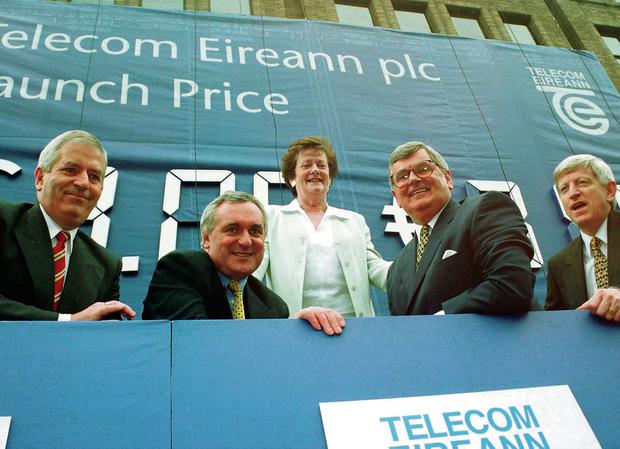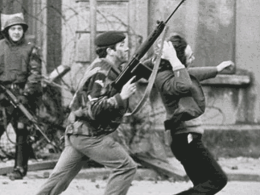By Robert Cosgrave
The RTÉ documentary, Sold: The Eircom Shares Saga, is not without its limitations, but it’s a more interesting fare than most of what you’d get from the “national broadcaster”. The documentary charts the story of the privatisation of the state-owned Telecom Eireann (later Eircom and now Eir) in 1999.
Population hoodwinked
The project of privatisation was spun as an exercise in “popular capitalism” – a phrase of Margaret Thatcher’s featured in the documentary – in which Irish people had only to buy into and they would be enriched by their shares in Eircom. Before a price was even set, the government and the media went into overdrive encouraging people to buy up shares. In fact, the entire electoral registry received letters asking how much they would like to spend on shares. Mary O’Rourke, the Fianna Fáil Minister for Public Enterprise – read, Minister for Privatisation – insisted that she never encouraged anyone to buy shares in Eircom. In reality, her and her government were only short of putting the signature at the bottom of the page.
After more than half a million people were hoodwinked into buying Eircom shares, they would quickly discover those shares were barely worth more than paper. By the time of Eircom’s first AGM at the RDS in September 2000, the shares had plummeted 30%, with thousands of angry buyers facing a board of directors who, whatever went down on the day, had jury-rigged a majority of votes for themselves. They might as well have held the AGM at Caesar’s Palace, because the house always wins. So much for any kind of ‘popular participation’ under the market.
Vulture asset-stripping
The documentary shows that the privatisation turned out to be a bacchanalia for asset-stripping capitalists – both international, and Irish capitalists such as Tony O’Reilly – with little more than the copper wire left over at the time of examinership in 2012. The after effects of the deceptive push for privatisation speak from themselves. From the days of Telecom Eireann being the largest employer in the state – with a workforce numbering 13,000 – about 10,000 jobs have been shed. When it comes to high-speed broadband – especially in rural areas – Ireland lags behind the majority of the advanced capitalist world.
These realities are not, however, as some claim in the documentary, merely a result of bad business decisions, but the conscious choice of speculators – including, scandalously, trade union leaders – to try and make quick and easy money, with no concern for the workers in the company or the actual service itself. It’s a basic feature of capitalism, and in this case one that is particularly naked. Telecommunications companies are in the business, not of productive investment in infrastructure and services, but of making profits.
Criminal role of trade union leaders
Two former General Secretaries of the Communications Workers’ Union (CWU) are interviewed as part of the show. Con Scanlon and David Begg (the latter would later exceed himself in providing complete misleadership of ICTU during both the years of the ‘Celtic Tiger’ boom and after the 2008 economic crash) attempt to cover up their role by bringing up their opposition to privatisation in 1992 – as though nothing happened in the ensuing seven years! Both figures represent the total acceptance by the Irish trade union leadership of the diktats of the market, and a complete lack of faith in the power of the working class to change society.
At one point, David Begg says that in a battle between workers and the government, the latter will always win. Of course with the likes of Begg as leaders that’s a self-fulfilling prophecy! Rather than seeing their role as leaders of workers in the fight against their bosses and the capitalist system more generally, these leaders prefer the tactics of back-room deals and horse trading over the heads of rank and file workers, even after these tactics have led only to bad deal after bad deal.
A socialist stance needed
The documentary would, unfortunately, have you believe that at the time the entire state was united in their all-class desire to sell off Telecom Eireann and live-large off the rewards of the deal and that no one could possibly have foreseen what would go wrong. The truth, however, is different. In contrast to the failures of the trade union leaders, the Socialist Party stood against the neoliberal dogma of the period, with our TD at the time Joe Higgins being the only member of the Dáil to oppose privatisation, calling it a “robbery of a vital state asset”.
One thing would be clear to any serious thinking viewer of the documentary: the capitalist market system has proven utterly incapable of delivering the necessary infrastructure to guarantee a high standard of living for all. This remains true on points of public transport, childcare, green energy, housing and countless others. What is needed is a working-class movement that fights for the telecommunications industry and other key industries and services that dominate, to be brought into public ownership, in which there is real popular participation in their running through democratic working-class control and management.












